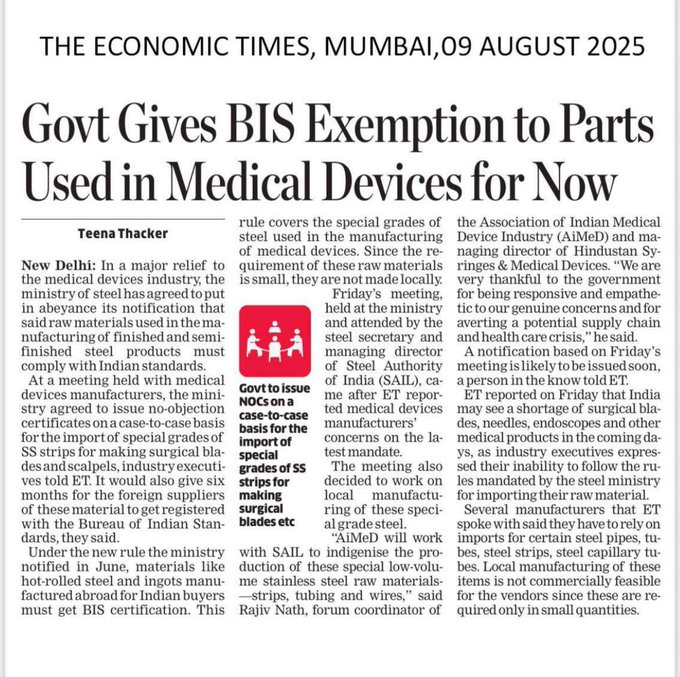The steel ministry has temporarily suspended its notification requiring Indian standards compliance for raw materials used in medical device manufacturing, offering relief to the industry. They will issue no-objection certificates for importing special stainless steel grades and allow foreign suppliers six months to obtain Bureau of Indian Standards (BIS) registration.
Medical devices industry heaved a sigh of relief after the Ministry of Steel agreed to put under abeyance, its earlier notification, with regard to which raw materials employed in manufacturing finished and semi-finished steel products in India should strictly adhere to the Indian Standards (IS). The medical device manufacturers in the country have applauded this move as they had feared being affected by the imminent supply chain interruptions, increase in costs, and low availability of the specialized grades of steel which are frequently imported by these manufacturers.
Background of the BIS Compliance Notification
Earlier, the government had required all raw material of some category of finished and semi-finished steel products to conform to the BIS specifications. Although this move was geared towards achieving standardization in terms of quality as well as safety in the use of steel, the medical devices industry was very vocal in protest. It was easy enough to explain: lots of high-grade stainless steels that go into surgical instruments, implants and other precision medical devices simply are not made in India in the quality or quantity needed.
Six-Month Window for Foreign Suppliers
Under this relaxation, foreign suppliers will be granted a six-month window to obtain the necessary BIS registration for their products. During this period, manufacturers in India can continue importing these specialized steel grades with a No Objection Certificate (NOC) issued by the government.
This measure strikes a balance between maintaining quality standards in the long term and ensuring that there is no immediate shortage of raw materials for critical healthcare manufacturing.
Relief for the Medical Devices Industry
Industry bodies have welcomed the move, saying it will provide breathing space to adapt to the new requirements without disrupting ongoing production. The exemption will also help maintain India’s competitiveness in the global medical devices market, where timely delivery and high-quality standards are key differentiators.
The decision is particularly significant for companies engaged in high-precision manufacturing, where the choice of raw materials directly affects product performance and patient safety. Specialized stainless steels with high corrosion resistance, strength, and biocompatibility are essential for implants, surgical tools, and hospital equipment.
Link to the Pharmaceutical Sector
Pharmaceutical sector is the beneficiary of the BIS exemption too indirectly. Most lab instruments, pharma manufacturing machines and storage vessels are made of same high grades of stainless steels now exempted to be immediately compliant. This promises that there will be no shortage of materials in the pharma sector and no rise in costs.
In the broader pharmaceutical landscape, business opportunities such as partnering with a monopoly medicine company in India are on the rise. These companies benefit from uninterrupted supply chains, allowing them to focus on expanding product reach without raw material bottlenecks. The recent BIS exemption ensures that their production processes for specialized drug manufacturing equipment remain unaffected.
Opportunities for Pharma Contract Manufacturing
The exemption also supports the pharma contract manufacturing company model, which relies heavily on efficient, large-scale production of medicines and healthcare products. With the supply of critical stainless steel components now assured, contract manufacturers can meet client demands without delays.
Pharma contract manufacturing companies often cater to both domestic and international clients, and uninterrupted access to quality raw materials is vital for maintaining compliance with global standards such as WHO-GMP, US FDA, and EU regulations.
Industry Response and Future Outlook
In the opinion of industry experts, this decision will serve as the transitional step between strict requirements related to regulatory matters and the realities of the industrial production. It offers an opportunity to the foreign suppliers to orient to the BIS regulations, and the Indian manufacturers to carry on with their business operations without undermining the quality or delivery schedule.
In the coming months, the focus will likely be on:
-
Encouraging Indian steel producers to develop capacity for specialized grades used in medical and pharmaceutical equipment.
-
Supporting foreign suppliers in the BIS registration process to ensure compliance within the six-month timeframe.
-
Promoting collaboration between the steel, medical devices, and pharmaceutical industries to develop India’s self-reliance in high-grade material production.
Conclusion
The temporary BIS exemption for parts used in medical devices is a pragmatic step by the government that addresses both industry concerns and long-term quality objectives. For now, it ensures that the production of life-saving medical equipment and critical pharmaceutical manufacturing tools continues without disruption.

